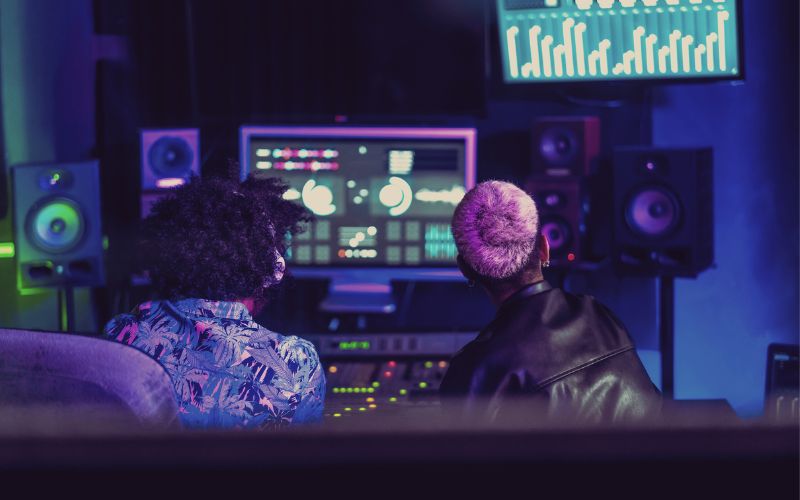Music Producer vs Engineer: What Is The Difference?

In the music industry, you have probably encountered the terms “music producer” and “engineer,” but do you know what distinguishes these roles from one another?
Music producers and engineers are vital professionals in the recording process, but their responsibilities and skill sets are quite different. Understanding these distinctions can help you appreciate the efforts that go into creating the final product and choose the right professionals to work with for your music projects.
KEY TAKEAWAYS
Music Producer vs Engineer
A music producer is the person who oversees and controls the entire recording session, guiding the creative direction of the project. They collaborate with the artist or band to refine their sound, develop the song structure, and enhance their performance.
A music engineer is responsible for operating the technical equipment in the recording studio, ensuring the highest sound quality during the recording, mixing, and mastering stages. While the music producer brings the creative vision, the engineer provides the technical expertise to make that vision a reality.
I’ve personally worked on many smaller projects where I was hired as the music producer but expected to also take care of all of the music engineer’s tasks. It’s common nowadays when the client is not a major label or publisher.
Role and Responsibilities of a Music Producer
Visionary and Artistic Influence
As a music producer, you significantly impact the visionary and artistic influence of the music you work on. You help shape a project’s creative direction and artistic vision, collaborating with artists to bring their ideas to life.
Music Composition and Production
Your role involves overseeing the music composition and production process. This includes creating and arranging melodies, beats, and harmonies to create the best sound for a song. You may even work with electronic music, adding digital elements to enhance the track’s sound.
Project Manager in the Studio
As the project manager in the studio, you are responsible for coordinating the entire production process. This entails scheduling studio time, managing budgets, and ensuring all sessions run smoothly. Your excellent communication skills are essential in this managerial role.
The Effect of Technology
You should be well-versed in using music technology, such as digital audio workstations, to get the best sound and meet industry standards. Staying updated on the latest tech trends helps you stay competitive and produce high-quality music.
Working with Session Musicians
Working with session musicians, you ensure they deliver their best performances by guiding them through the recording process. By collaborating with these talented session players, you contribute to the creation of a hit song.
Career and Education
A solid career path in music production may involve formal education, vocational training, or self-taught skills. Institutes of production offer degree programs that can provide a strong background in music and help you build a successful career in the industry.
Effective Marketing and Promotion
As a music producer, you’re also responsible for finding the best marketing and promotion strategies for the music you create. This includes using social media, connecting with influencers, and tailoring your promotional efforts to reach your target audience.
Collaboration with Artists
At the core of your role as a music producer is the ability to collaborate with artists and understand their vision. Together, you create a unique sound that showcases their talent while contributing your creative input to enhance the final product.
Who is a Music Engineer
Technical Expertise and Roles
As a music engineer, you need to have exceptional technical expertise in the field of audio production. Your primary focus is on the technical aspects of music production, such as capturing the best performances and ensuring optimal sound quality.
You will work closely with other professionals in the music industry, such as mix engineers, mastering engineers, and producers.
Live Performance and Studio Skills
You will be responsible for live performances and studio recordings as a music engineer. In live performances, your responsibility is to manage the live sound and audio equipment to maintain an enjoyable experience for the audience. On the other hand, in studios, you need to have hands-on experience with various studio equipment and control the recording process while working with artists and producers.
Working with Audio Equipment
You will work with a wide range of audio equipment as a music engineer. It is crucial to be well-versed with the latest recording equipment and have a strong background in music technology. Knowing the technical aspects of recording music ensures the best way to capture sound, whether live or in-studio.
Recording and Mixing Process
Being an integral part of the recording process, you must be adept at handling individual tracks and multitrack sessions. Good communication skills are essential to ensure the best performance in the final recording. Collaborating with artists, a good engineer actively offers creative input while addressing technical challenges that arise during the entire process.
A big part of your job is to dial in individual elements in the mix using tools like volume, panning, EQ, compression, delay and reverb. For example getting solid kick and snare sounds for the drumkit are part of your tasks.
Career and Education
To become a music engineer, it is essential to have a formal education in audio engineering or music technology. Vocational training or hands-on experience is valuable as well. A strong background in the technical aspects of music production and effective communication skills can pave the way for a successful career path.
Working with Artists and Producers
You will frequently collaborate with artists and music producers in your role as a music engineer. While there is a lot of overlap and talented people on both sides, the primary difference lies in the technical knowledge – a music engineer’s forte.
Like a movie director working with actors, you, as the music engineer, will contribute with your holistic approach while ensuring the audio tracks make it to the final product.
Audio Tracks and the Final Product
You are responsible for overseeing sound quality throughout the entire process, from recording to mixing and mastering. You aim to ensure that the final product offers a crystal-clear mix that listeners can enjoy. This involves working closely with the mix and mastering engineers to ensure everything sounds consistent.
Understanding the Music Industry
As a music engineer, it is vital to have an understanding of the music industry. You will work in various settings, including recording studios and live performances, so knowing how the music business functions is crucial. This knowledge will help you communicate better with artists, producers, and other professionals in the field.
Real Life Experiences
Gaining hands-on experience is invaluable in building your career as a music engineer. Working with different people and in different situations will equip you with the technical and interpersonal skills needed to navigate the music industry. Learning from real-life experiences and absorbing essential knowledge can be the key to success.
Music Producer vs Engineer: The Different Roles

Creation and Vision vs Technical Execution
As a music producer, your focus is on the overall creation and vision of the project. Your job is to guide the artist’s vision and work together to achieve the best sound for the recording.
Music production relies heavily on collaboration, communication, and artistic vision to bring out the best performances from artists and session players.
On the other hand, engineers handle the recording process’s technical side. They use their expertise to capture the sounds from the studio setting and create a polished final product.

Leadership and Management vs Hands-on Roles
When working as a music producer, you take on more of a leadership and managerial role in the recording process. Not only do you oversee the entire process, but you also work closely with artists, session musicians, and others involved in the project.
You ensure that the recording meets the artistic vision and stays within budget and deadlines. Engineers, however, have a more hands-on role, using their technical knowledge to operate music equipment and software, allowing them to focus on capturing the best possible performance.

Music Composition vs Audio Mixing
Music producers are often also involved in the music composition process. While this is not always the case for every project, many producers contribute to the recordings’ creative input, song arrangements, and overall structure.
Engineers focus more on the audio mixing process, where individual tracks and audio elements are combined and polished using various tools and techniques to create a cohesive and balanced final mix that showcases the artist’s vision.

Collaboration with Artists
Developing effective communication and collaboration skills with artists is key to your success as a music producer. Understanding their creative vision and helping to take it to new heights is essential for a successful project.
Engineers also collaborate closely with artists and producers, but they focus on ensuring the technical aspects of the music production process are executed efficiently and effectively. This collaboration ultimately creates the best possible performance, allowing everyone involved to achieve their goals throughout the recording process.
Frequently Asked Questions
What are the main differences between a music producer and an audio engineer?
A music producer focuses on the creative side of music, guiding the artistic direction, arranging songs, and making artistic decisions. On the other hand, an audio engineer handles the technical side of music, such as recording, mixing, and mastering. To sum it up, producers are responsible for the song’s vision, while engineers ensure the sound quality is top-notch.
What are the distinct roles of a producer, engineer, and mixer?
A producer oversees the entire music production process, collaborating with artists and providing guidance on song concepts, arrangements, and overall sound. Engineers focus on the technical aspects, such as microphone placement, recording equipment, and soundproofing. Finally, a mixer blends the individual audio tracks, balancing the levels and applying effects to create a polished final product.
Which career path has a higher salary: music producer or audio engineer?
Salaries in the music industry vary greatly and depend on factors such as experience, location, and the size of projects one works on. Generally speaking, both music producers and audio engineers have the potential to earn good incomes. In some cases, music producers may earn more due to their involvement with potential royalties and lucrative projects.
How can one become both a music producer and a sound engineer?
To become proficient in both roles, you will need to develop skills in both the artistic and technical aspects of music production. Start by learning music theory, songwriting, and arrangement. Also, I gained hands-on experience with recording equipment, software, and mixing techniques. Please attend workshops, courses, or degree programs related to music production and audio engineering.
What are the education options for music production and audio engineering?
You can pursue formal music production or audio engineering education through diploma, certificate, or degree programs at various institutions. Additionally, there are online courses and tutorials available to learn specific skills. Networking and gaining practical experience through internships or assisting established professionals is also highly valuable.
Is it more beneficial to pursue sound engineering or music production?
It depends on your personal interests and career goals. Sound engineering may be a better fit if you have a strong passion for the technical side of music and enjoy working with audio equipment. However, pursuing music production may be more fulfilling if you find yourself drawn to the creative process, guiding the artistic direction, and collaborating with artists. Ultimately, both paths offer rewarding experiences and can provide opportunities for long-term success in the music industry.
Conclusion
The roles of music producers and engineers are the foundation and framework of sound recording.
Music producers are the creative architects, overseeing the recording process and collaborating with the artist. They often function as project managers in the studio.
One famous example of a producer is Quincy Jones, who has helped bring to life some of the most amazing music and has helped launch the careers of some of the most iconic artists of all time.
Engineers provide the crucial technical skills required to capture and enhance sound quality, ensuring the mix comes together seamlessly.
Both music producers and engineers play a pivotal role in creating a successful music production, combining the creative aspects and technical skills necessary for making good music.





